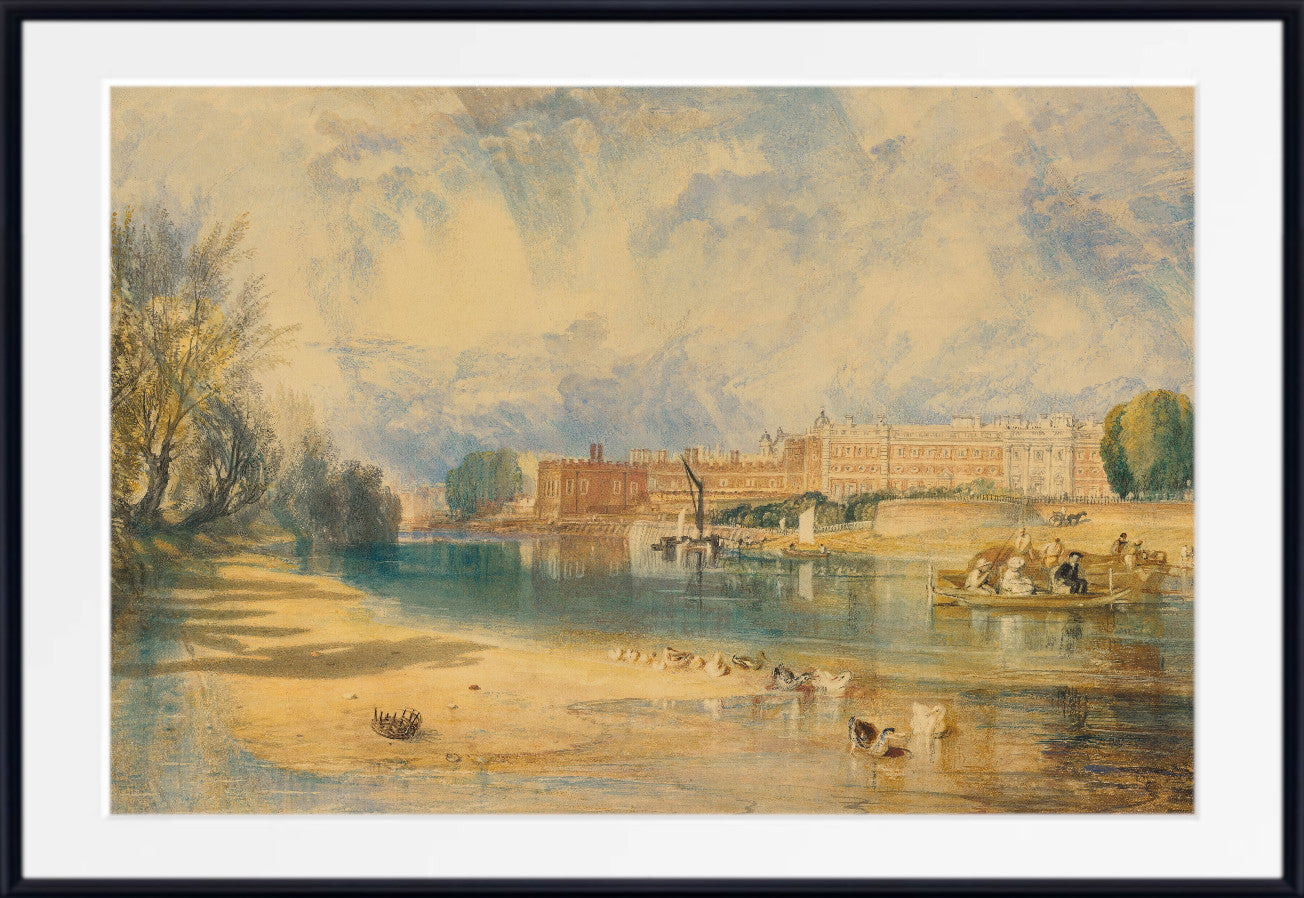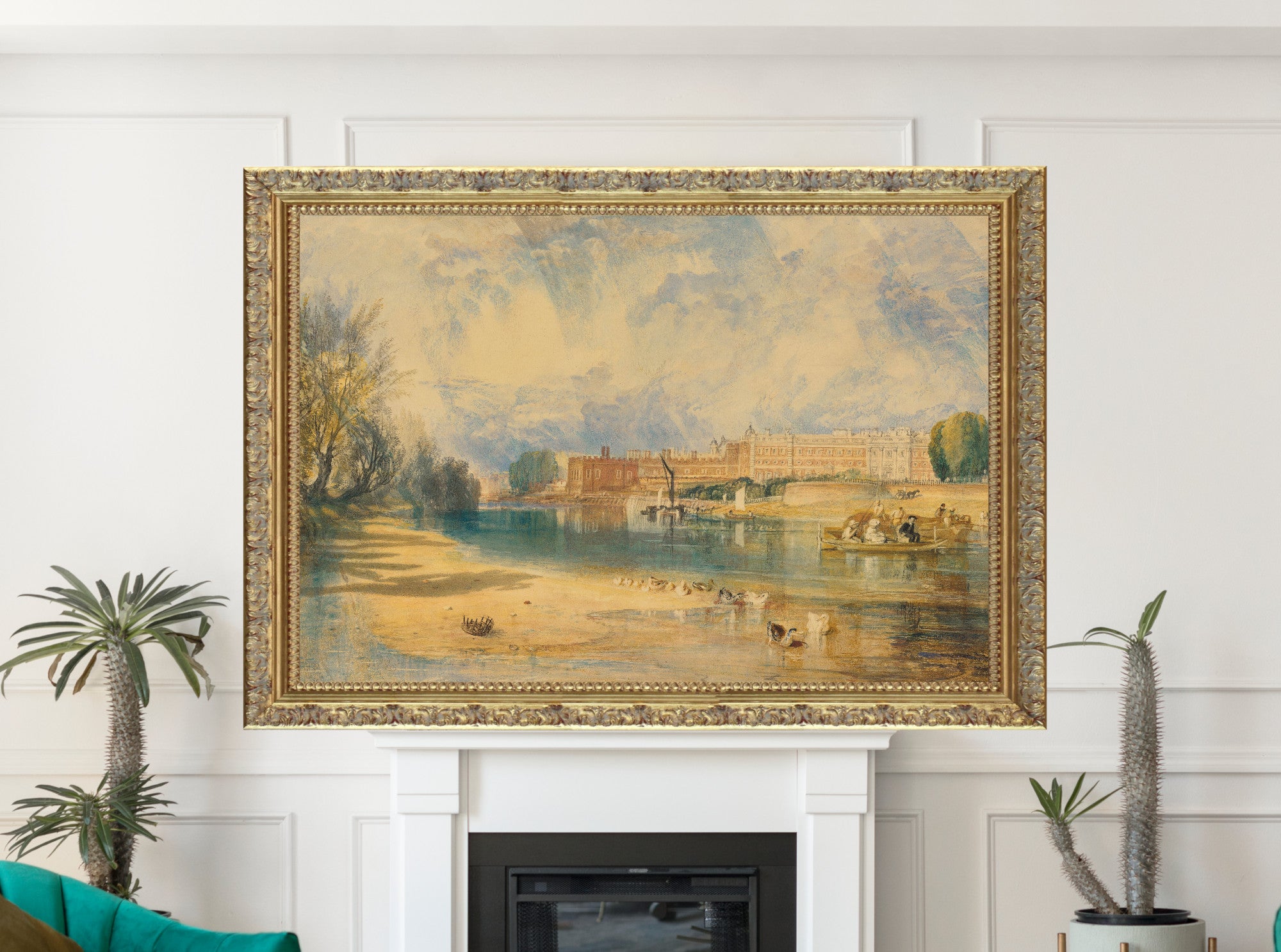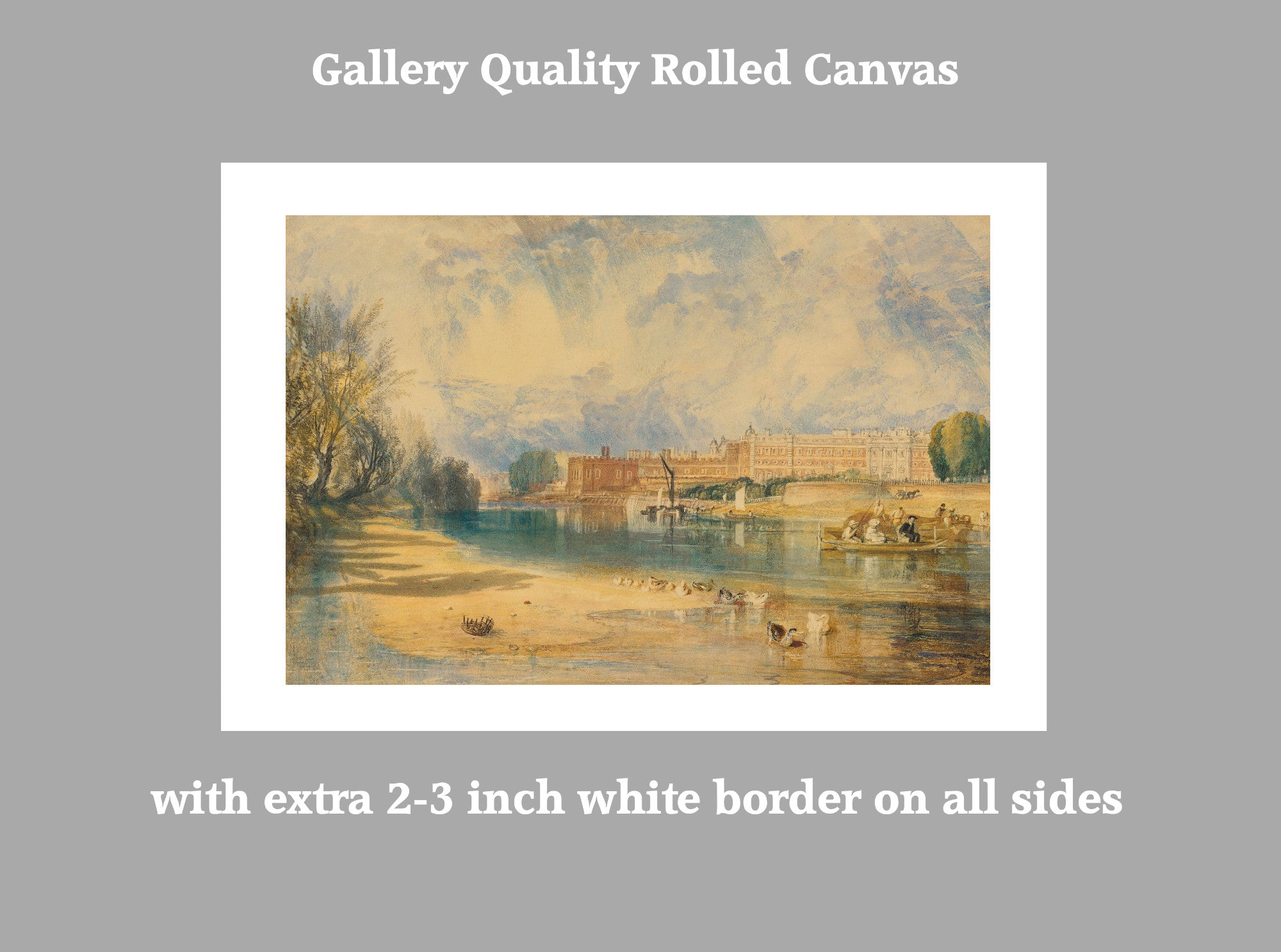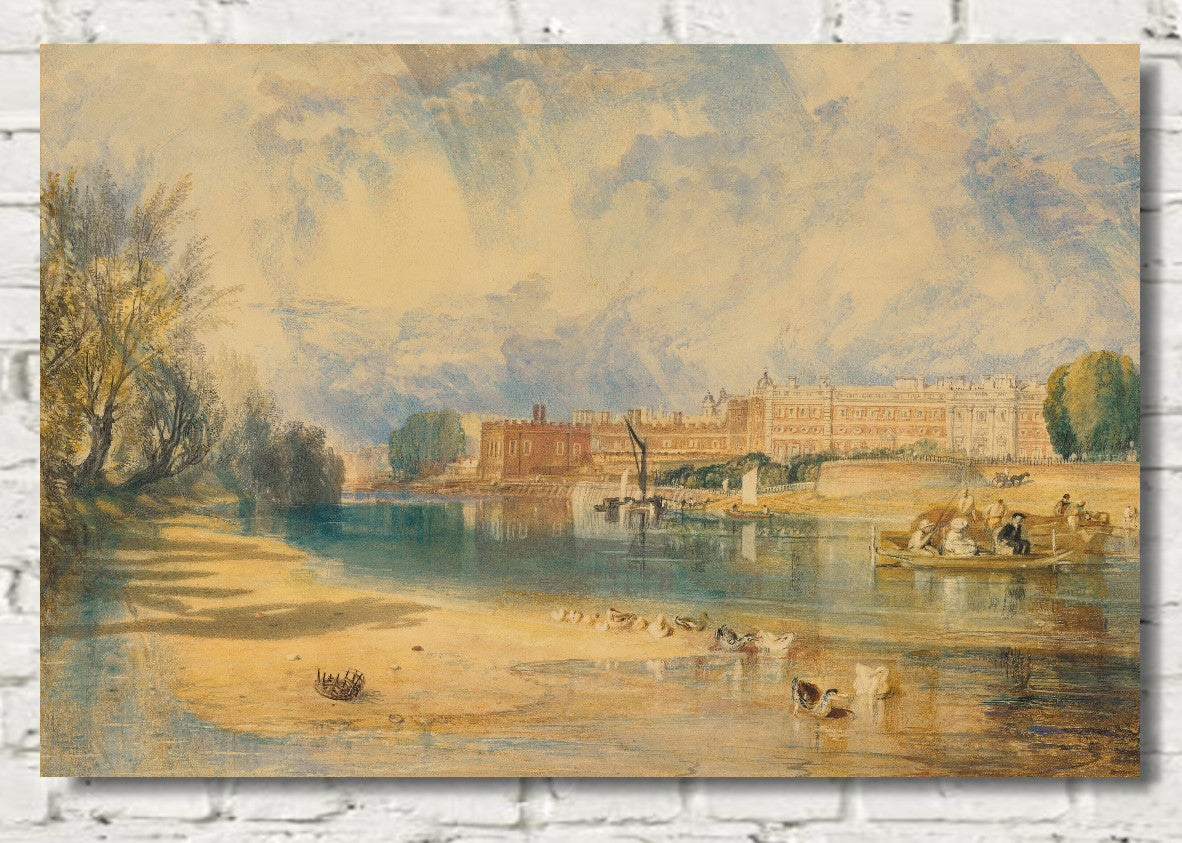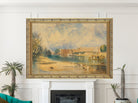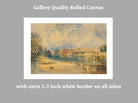Hampton Court Palace by William Turner
Couldn't load pickup availability
Hampton Court Palace by William Turner - Prints and Ready to Hang Canvas Panels
Exploring Turner's Hampton Court Palace Watercolour
By the Thames: A Unique View of Hampton Court Palace
Turner's Fascination with Hampton Court Palace
Joseph Mallord William Turner, one of Britain's most celebrated painters, is renowned for his innovative approach to art. In one of his lesser-known works, he offers a unique perspective of Hampton Court Palace, challenging the viewer's expectations. This watercolour masterpiece captures Hampton Court Palace from an unusual angle, providing an informal and enchanting view from the river.
Architectural Contrasts
Turner carefully selected his vantage point, capturing the convergence of the Thames with its tributaries, the Mole and Ember. This choice allowed him to showcase the architectural evolution of Hampton Court Palace over two centuries. On the right side of the composition, the South Front's rhythmic lines dominate, a testament to William III and Mary II's late 17th-century vision and Sir Christopher Wren's architectural prowess. To the left, the Tudor palace, shaped by Cardinal Wolsey, offers a stark contrast with its crenellated brickwork and towering gateways. These elements come together at the 'Little' Banqueting House, designed by William Talman for William and Mary, offering a view directly onto the river.
Symbolic Imagery
Turner's work often contains symbolic elements, and in this watercolour, the foreground presents a decaying basket, possibly alluding to a broken crown. A procession of quarreling ducks may represent the tumultuous events leading to William of Orange's coronation as king. Turner's interest in these historical events is further exemplified in another painting from five years later, depicting The Prince of Orange's arrival in Torbay in 1688.
Turner's Ongoing Relationship with Hampton Court Palace
Turner's connection with Hampton Court Palace dates back to 1805 when he first depicted it while exploring the upper Thames. He initially created an oil painting, displaying a broad composition in a limited palette. Turner's fascination with the Thames continued to inspire him, leading to numerous sketches, studies, and finished works. However, the painting that remains unfinished, but significant, in his journey is the one depicting Hampton Court Palace.
The Birth of a Series
Around 1825, Turner embarked on an ambitious project, "Picturesque Views in England and Wales." This topographical series aimed to publish engravings based on Turner's watercolours. The watercolour of Hampton Court Palace was part of this venture. Turner's approach to this series involved meticulous study and experimentation, as evident in the vivid portrayal of the sky and clouds, achieved through countless observations and experimental watercolour studies.
A Glimpse into Turner's Creative Process
Turner's artistic process is illuminated through his sketches and preliminary watercolours. These "colour beginnings" helped him establish lighting, shadow placement, and colour tones. Comparing the study of Hampton Court Palace with that of the old wooden bridge that once spanned the Thames reveals a shared colour palette and an emphasis on turquoise blue in both representations of the river.
Thames Inspirations
Turner's fascination with the Thames was not confined to Hampton Court Palace. He explored and painted various Thames-related scenes, each capturing the river's unique essence and atmosphere. His works often convey a sense of tranquillity and the timeless beauty of the Thames.
Legacy and Impact
Over the years, Turner's watercolours have gained appreciation, shedding light on the social and industrial changes of his time. Exhibitions like "Turner's Modern World" at Tate Britain and the Museum of Fine Arts in Boston underscore the significance of Turner's "Picturesque Views in England and Wales" series, demonstrating how these works continue to inspire and inform contemporary audiences.
In sum, Turner's watercolour of Hampton Court Palace provides a unique perspective on this historic landmark while offering a glimpse into the artist's creative process and the evolution of his topographical series. Through his mastery of light, colour, and composition, Turner transports viewers to a timeless and enchanting world along the banks of the Thames.
Understanding William Turner's Artistry
Joseph Mallord William Turner, a renowned English painter, left an indelible mark on the art world with his distinctive style and innovative techniques. His mastery of light, color, and atmosphere transformed landscapes into poetic expressions.
Innovative Techniques and Style
Turner's innovative use of watercolors pushed the boundaries of traditional painting. He employed techniques like wet-on-wet and scraping to create luminous effects, giving his works an ethereal quality. His bold brushwork and vivid colors showcased nature's dynamic beauty, capturing both its grandeur and subtleties.
Capturing Nature's Essence
Turner had a unique ability to capture the essence of nature. His landscapes were not just literal representations but emotional experiences. Through skillful use of light and shadow, he infused his paintings with a sense of movement and life, making viewers feel the wind, hear the rustle of leaves, and sense the depth of the landscapes.
Symbolism and Narrative
Beyond the visual appeal, Turner's paintings often carried symbolism and narratives. He conveyed powerful themes, such as the force of nature, the passage of time, and the human connection to the environment. His choice of subjects and compositions reflected his deep understanding of history, literature, and mythology, adding layers of meaning to his artworks.
Legacy and Influence
Turner's innovative techniques and artistic vision had a profound influence on future generations of artists. His ability to convey emotion through landscapes paved the way for Impressionism and abstraction. Today, art enthusiasts and scholars continue to study Turner's works, marveling at the timeless beauty and innovation that define his artistic legacy.


All prints are made using archival art stocks and UV pigment inks to give up to 200 years life. Prints are sold unframed and unmounted.
All orders for unframed fine art prints and original paintings are dispatched within 2 working days of receipt of payment.
Orders for custom framed prints are dispatched within 4 working days.
All orders are fully tracked from dispatch to delivery at your home or business.
All print and original painting orders are fully insured against loss or damage in transit. We refund or replace any damaged or lost orders.
Buy with confidence - read what our satisfied customers have to say - Reviews
Fine art papers are printed without any additional white border Please let us know at the time of ordering if you would like a small additional white border.
Rolled canvas options have an additional white border of approximately 2.5 inches (7cm) on all 4 sides to aid stretching.
Ready to hang canvas panels are stretched on 1.5 inch deep solid pine frames from sustainable forestry sources. The image is mirrored on all 4 sides to give an aesthetically pleasing finish.
Why not have us gift wrap your order and attach a personalised message to the recipient. Available for all orders. Each order is hand wrapped in high quality gift wrap with meatllic ribbon and bow. Your personalised message is printed on a card which is included with your order.
Have your hand wrapped gift delivered directly to the recipient.
Full tracking and insurance included with every order.
Please note design may vary depending upon availability
Just purchase the gift wrap option HERE
Why Choose GalleryThane?
- Printed and framed in-house
- Free UK delivery
- Free EU an USA delivery on orders over £200
- Tracking and insurance included in every order
- Fast 1-3 day dispatch
- Gift wrapping service available
- Gallery quality materials
- Sustainable, eco-friendly packaging
- Great customer support
What makes our Prints and Canvas Panels so special

Latest Giclee Printing Technology
We have invested in the latest wide format print technology to produce museum quality giclee prints utilising the highest quality pigment inks to give outstanding colour reproduction.

Museum Quality Archival Fine Art Papers
We print on the finest quality fine art papers with textured, smooth and lustre finishes for prints which last a lifetime.
From aceo miniatures to 40x80 inch large format, every print has our lifetime quality guaranteee.

Solid Wood Frames, Cotton Canvas
All of the wood for our canvas panels and frames is responsibly sourced from manages forests. Our cotton canvas is completely seedless for the highest quality reproduction possible.

